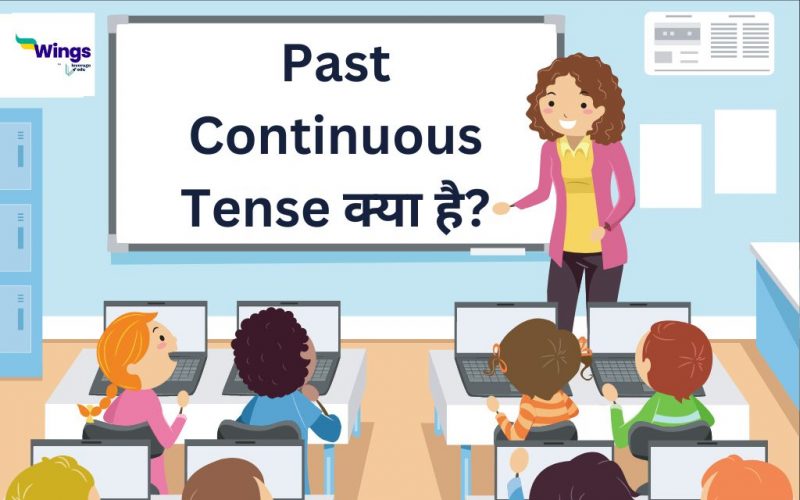टेंस इंग्लिश ग्रामर का बेसिक और सबसे महत्वपूर्ण टॉपिक है। इंग्लिश सिखने के लिए आपको टेंस आने बहुत जरुरी है। इंग्लिश में टेंस तीन प्रकार के होते हैं- Past Tense, Present Tense, Future Tens, जिन्हें चार-चार भाग में बांटा गया है। टेंस को विस्तार से समझने के लिए हमे उसके हर भाग को बारीकी से समझना होगा। आज के इस ब्लॉग में हम past continuous tense in Hindi नियम, उदाहरण, एक्सरसाइज के बारे में विस्तार से जानेंगे।
Past Continuous Tense in Hindi क्या हैं?
Past continuous tense में किसी काम का जारी रहना भूतकाल में पाया जाता है। इस टेंस के वाक्य का अन्त ‘रहा था’ ‘रही थी’ ‘रहे थे’ जैसे- शब्दों से होता है।
Past Continuous Tense in Hindi के उदाहरण
Past Continuous Tense in Hindi के उदाहरण नीचे दिए जा रहे हैं:
- I was singing.
- We were sleeping.
- I was eating.
- We were writing.
- We were thinking.
- He was sweating profusely.
- I was reading this book this time yesterday.
Past Continuous Tense in Hindi में क्रिया (Verb)
Past Continuous Tense in Hindi में वर्ब (Verb) की फर्स्ट फोर्थ फॉर्म के साथ ing का प्रयोग किया जाता है।
जैसे: going, eating, singing, working, dancing, sleeping, playing, crying आदि।
Helping Werb
Past continuous tense में was/were, helping verb का प्रयोग किया जाता है।
- Was का प्रयोग फर्स्ट पर्सन सिंगुलर नंबर (I) और थर्ड पर्सन सिंगुलर नंबर (He, She, It, Name) के साथ किया जाता है।
- Were का प्रयोग फर्स्ट पर्सन प्लुरल नंबर (We), सेकंड पर्सन (You) और थर्ड पर्सन प्लुरल नंबर (They) के साथ किया जाता है।
यह भी पढ़ें: Present Indefinite Tense in Hindi: परिभाषा, नियम, उदाहरण, एक्सरसाइज
Past Continuous Tense in Hindi वाक्यों की पहचान कैसे करें?
जब हम Past continuous tense की बात कर रहे हैं तो हमें उसकी वाक्य पहचान भी आनी चाहिए अन्यथा आप कंफ्यूज हो जाएंगे कि यह किस प्रकार का वाक्य है। इसके लिए हम आपको इस टेंस का सेंटेंस स्ट्रक्चर बता रहे हैं:
| सेंटेंस | नियम |
|---|---|
| Affirmative | sub + was/were + v4 ing + obj |
| Negative | sub + was/were + not + v4 ing + obj |
| Interrogative | was/were + sub + v4 ing + obj + ? |
| Interogative Negative | was/were + sub + not + v4 ing + obj + ? |
| Question word | Wh_questions + was/were + sub + v4 ing + object? |
Subject किसे कहते हैं?
किसी भी वाक्य में कार्य करने वाला सब्जेट होता हैं। जैसे: राम आम खाता है, इस वाक्य में राम आम खा रहा है इसलिए राम सब्जेक्ट है खाना क्रिया है और आम ऑब्जेक्ट है।
Verb किसे कहते हैं?
किसी भी वाक्य में सब्जेक्ट के द्वारा जिस कार्य को किया जाता है उसे क्रिया कहते है जैसे: खाना, खेलना, गाना, रोना, नहाना आदि। सामान्यत: verb की पांच फॉर्म होती हैं लेकिन इस टेंस में verb की सिर्फ थर्ड फॉर्म का प्रयोग किया जाता है।
Object किसे कहते हैं?
सब्जेक्ट द्वारा किसी कार्य को करने से क्रिया का असर जिस पर पड़ता है उसे ऑब्जेक्ट कहते हैं।
Past Continuous Tense in Hindi में सेंटेंस के प्रकार
इस टेंस में 4 प्रकार के सेंटेंस होते हैं:
- Affirmative sentences
- Negative Sentences
- Interrogative Sentences
- Negative Interrogative Sentences
Past Continuous Tense in Hindi– Affirmative Sentence
sub + was/were + v4 ing + obj
- I was saying.
- He was telling me.
- They were telling me.
- A river was flowing.
- Buffaloes were wallowing in the mud.
- Buffalo were wallowing in the mud.
- I was waiting for my turn in the queue.
- We were saying.
- He was coming.
- They were coming.
Past Continuous Tense in Hindi– Negative Sentence
sub + was/were + not + v4 ing + obj
- They were not looking at me.
- He was not praising you.
- They were not praising you.
- Waves were not crashing on the shore.
- People were not drawing water from a well.
Past Continuous Tense in Hindi- Interrogative Sentence
was/were + sub + v4 ing + obj + ?
- Was he going Delhi
- Was the bird flying?
- Was he ringing the bell ?
- Were they praising you?
Past Continuous Tense in Hindi- Negative Interrogative Sentence
was/were + sub + not + v4 ing + obj + ?
- Was he not going Delhi
- Was the bird not flying?
- Was he not ringing the bell?
- Were they not praising you?
उम्मीद है आपको Past Continuous Tense in Hindi का ब्लॉग अच्छा लगा होगा। ऐसे ही अन्य रोचक और महत्वपूर्ण ब्लॉग पढ़ने के लिए Leverage Edu के साथ बने रहिए।

 One app for all your study abroad needs
One app for all your study abroad needs



















 45,000+ students realised their study abroad dream with us. Take the first step today.
45,000+ students realised their study abroad dream with us. Take the first step today.

